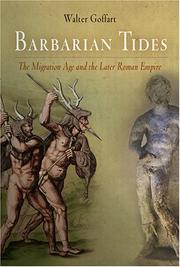| Listing 1 - 5 of 5 |
Sort by
|
Book
ISBN: 0333800273 Year: 2000 Publisher: Houndmills Basingstoke Hampshire Macmillan
Abstract | Keywords | Export | Availability | Bookmark
 Loading...
Loading...Choose an application
- Reference Manager
- EndNote
- RefWorks (Direct export to RefWorks)
Grandes migrations --- Migrations de peuples --- Migrations of nations --- Nations [Migration of ] --- Volksverhuizingen --- Eurasia --- History

ISBN: 2738440967 Year: 1996 Volume: *1 Publisher: Nicosia KYKEM
Abstract | Keywords | Export | Availability | Bookmark
 Loading...
Loading...Choose an application
- Reference Manager
- EndNote
- RefWorks (Direct export to RefWorks)
Ethnic groups --- Etnische groepen --- Grandes migrations --- Groupes ethniques --- Migrations de peuples --- Migrations of nations --- Nations [Migration of ] --- Race --- Ras --- Volksverhuizingen --- Emigration and immigration --- Immigrants --- Minorities --- Human geography. --- Human rights. --- Ethnic and racial groups. --- Minorities. --- Immigrants. --- Conferences. --- Congresses.

ISBN: 1857288386 9781857288384 020398448X 9780203984482 9786610138159 661013815X 1857288378 9781857288377 1135359326 1135359334 1280138157 9781135359287 9781135359324 9781135359331 Year: 1998 Publisher: London UCL Press
Abstract | Keywords | Export | Availability | Bookmark
 Loading...
Loading...Choose an application
- Reference Manager
- EndNote
- RefWorks (Direct export to RefWorks)
This introductory and comparative study will develop the theoretical concept of a diaspora and investigate the formation and reformation of diasporic groups in relation to issues of socio-economic development, human rights and the nation state.
Grandes migrations --- Migrations de peuples --- Nations [Migration of ] --- Volksverhuizingen --- Emigration and immigration --- History --- 20th century --- Migrations of nations --- Emigration and immigration. --- Population geography. --- Refugees. --- World politics. --- Political Science. --- Social Science. --- Population geography --- Refugees --- World politics

ISBN: 0198202342 Year: 1991 Volume: *52 Publisher: Oxford Clarendon
Abstract | Keywords | Export | Availability | Bookmark
 Loading...
Loading...Choose an application
- Reference Manager
- EndNote
- RefWorks (Direct export to RefWorks)
Goten --- Goths --- Grandes migrations --- Migrations de peuples --- Migrations of nations --- Nations [Migration of ] --- Volksverhuizingen --- Rome --- History --- Histoire --- Nations, Migrations of --- Human beings --- Ethnology --- Germanic peoples --- Migrations --- -Goths --- -Goten --- Rim --- Roman Empire --- Roman Republic (510-30 B.C.) --- Romi (Empire) --- Europe --- Empire, 284-476 --- Goths. --- Migrations of nations. --- Rome - History - Empire, 284-476.

ISBN: 0812239393 9780812239393 9780812221053 0812221052 9786613210760 1283210762 0812200284 Year: 2010 Volume: *65 Publisher: Philadelphia : University of Pennsylvania Press,
Abstract | Keywords | Export | Availability | Bookmark
 Loading...
Loading...Choose an application
- Reference Manager
- EndNote
- RefWorks (Direct export to RefWorks)
The Migration Age is still envisioned as an onrush of expansionary "Germans" pouring unwanted into the Roman Empire and subjecting it to pressures so great that its western parts collapsed under the weight. Further developing the themes set forth in his classic Barbarians and Romans, Walter Goffart dismantles this grand narrative, shaking the barbarians of late antiquity out of this "Germanic" setting and reimagining the role of foreigners in the Later Roman Empire.The Empire was not swamped by a migratory Germanic flood for the simple reason that there was no single ancient Germanic civilization to be transplanted onto ex-Roman soil. Since the sixteenth century, the belief that purposeful Germans existed in parallel with the Romans has been a fixed point in European history. Goffart uncovers the origins of this historical untruth and argues that any projection of a modern Germany out of an ancient one is illusory. Rather, the multiplicity of northern peoples once living on the edges of the Empire participated with the Romans in the larger stirrings of late antiquity. Most relevant among these was the long militarization that gripped late Roman society concurrently with its Christianization.If the fragmented foreign peoples with which the Empire dealt gave Rome an advantage in maintaining its ascendancy, the readiness to admit military talents of any social origin to positions of leadership opened the door of imperial service to immigrants from beyond its frontiers. Many barbarians were settled in the provinces without dislodging the Roman residents or destabilizing landownership; some were even incorporated into the ruling families of the Empire. The outcome of this process, Goffart argues, was a society headed by elites of soldiers and Christian clergy-one we have come to call medieval.
Grandes migrations --- Migrations de peuples --- Migrations of nations --- Nations [Migration of ] --- Volksverhuizingen --- Migrations of nations. --- Europe --- Rome --- History --- Histoire --- Nations, Migrations of --- Human beings --- Migrations --- 392-814 --- Germanic invasions, 3d-6th centuries --- Germanen. --- Late oudheid. --- Migrations de peuples. --- Volksverhuizing. --- Völkerwanderung. --- Germanic Invasions of Rome (3rd-6th centuries). --- 200-814. --- Europe. --- Rome (Empire). --- Romeinse rijk. --- Römisches Reich. --- Invasions germaniques --- Europe - History - 392-814 --- Rome - History - Germanic Invasions, 3rd-6th centuries --- Ancient Studies. --- History. --- Medieval and Renaissance Studies.
| Listing 1 - 5 of 5 |
Sort by
|

 Search
Search Feedback
Feedback About UniCat
About UniCat  Help
Help News
News